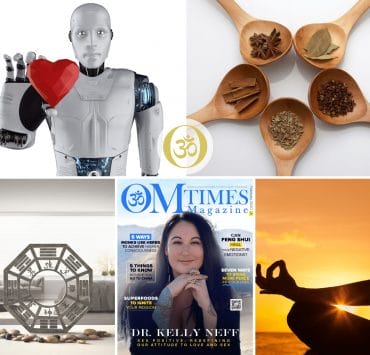Dr. Kelly Neff – The Future of Love and Intimacy

Sandie Sedgbeer: Isn’t marrying them taking it a bit too far? Where is the love in that? Where is the joy in the union? Where is the transcendent spiritual experience?
Kelly Neff: It is very trans-humanistic, isn’t it? In addition to potentially forming relationships with sex robots, we are also potentially going down a road of trans-humanistic biohacking where we become the robots a little bit. We’re already 3D printing organs so is it hard to believe that a man might get an implant in his crotch that makes his penis turn into a vibrator when he’s having sex with a woman.
Sandie Sedgbeer: It is very mechanistic, isn’t it? When you read in your book that adults today are having less sex than adults did 30 years ago, one has to wonder what’s going on here?
Kelly Neff: I think that really it comes down to this digital revolution. So, for me, I’m a Xennial, which is this sub-generation of people born between 1977 and 1983. We’re in-between Generation X and the Millennials. I was born in 1982, but what makes us unique is that we have spent literally half our lives without technology and then half with it. So, I feel I’m in this weird little pocket where I’ve seen everything change, everything. And one of these is that now Millennials and Gen Zs are having a little less sex with partners than their boomer parents did about 30 years ago. But they’re having more types of different sex. So, they’re masturbating much more. They’re realizing they don’t need another person to get them off because of pornography. Pornography, self-stimulation, self-pleasuring, and masturbation have become more accessible than they’ve ever been before because it’s been normalized for this generation. And so, it’s not a big deal for them.
Sandie Sedgbeer: Thinking about how the younger generation have their relationships through their telephones, they communicate with people, but they don’t speak to people anymore, is this part of the same trend?
Kelly Neff: Absolutely. The DM-ing, the snap-chatting, nude sexting… Again, it’s a double-edged sword because we are more connected than ever but we’re also more isolated when it comes to real human contact and relationships. With online communication comes a whole slew of other problems – treating each other like crap because there’s no accountability when you’re communicating with strangers on the internet. So, ghosting and cuffing – cuffing is when you just look for someone to be with for the holidays in person because you don’t want to be alone, and then you un-cuff as soon as it gets warm again and it’s time to go flirt. It’s hard to say if humans were always crappy to each other when it comes to love and dating, or if it’s being magnified and amplified now because the media we’re using just lends itself towards that type of communication.
Sandie Sedgbeer: That’s an interesting point, isn’t it? Is this just a phase on the way to something else? We don’t know. Only history will tell us. So, how has the idea of being spiritual but not religious – which seems to be what many of the young claims to be – become part of their approach to sexuality?
Kelly Neff: That’s a really great question. And that’s why there’s a duality and a balance to things because on the one hand, there’s porn and ‘we want robot sex and sex dolls and we don’t want to connect, but then on the other side we’re also desperate for a deeper connection.’ Just look at the popularity of yoga retreats that people go to on their bachelorette parties instead of going to get drunk. We’re leaning towards a holistic model of life, and we’re searching for it because we’re under a lot of stress or pressure for perfectionism, especially this generation, and we’re looking for a way to balance because a lot of the medication we’re being prescribed doesn’t work.
So, the reason I believe that we’re becoming more spiritual but not religious and integrating that into our sexuality is because we know there is an unconscious, deeper knowledge within us about the importance of sacred union and the importance of sexuality. Not just for physical pleasure but also for our creativity and enhance our lives. That this is a gift, and it’s here for our own wellness, and I feel that in times of immense change and struggle, we somehow find ourselves called back to our true essence.
Sandie Sedgbeer: So, we have this dichotomy going on. We’ve got the younger generation with robotic sex, self-sex, hooking up, and not having deep relationships, and, at the same time, we’ve got this whole other movement – looking within, finding that spiritual wholeness. How do they reconcile that?
Kelly Neff: I have to say I’ve been there, too. When we’re talking about say, tantra, or Taoism, or even the White Tigress tradition, these are all spiritual traditions that are suddenly, to use the Reddit term, getting up-voted in terms of our cultural consciousness, and people are reading the books and talking about them, but it can be scary. I just did a show on Tantric sex last week with Dr. Jeffre TallTrees and Somraj Pokras and they’re experts. They’re an older couple who’ve been married for years. They do Tantric sex all the time and talk in sex workshops, and one of my questions was for our generation, my generation H How do you make sure your partner is actually down for this because it can be very intense and we shun any level of intense connection but yet we want it and this is the ambivalence? You’re absolutely right.
Sandie Sedgbeer: What about love? Where does that come into it? Are the young not interested in love? Are they afraid of love? Do they feel that they’re too young for love? That it comes later?
Kelly Neff: Good question. I think the metrics that measure love have shifted. The sex robot thing that was one of my biggest concerns. If you could be married to a sex robot, but you can just turn off what’s been programmed for your pleasure, what does that mean about love? Are we afraid to get down and dirty and make sacrifices because love is hard work? Being in love is not all turtle doves, fairies, and roses. There is a compromise, there is honesty, there is truth; things that you have to engage in to be in love. You have to be vulnerable, and yet some of us want that. Some of us want that so much, in fact, that we will find ourselves, as I have been in the past, in multiple loving relationships at the same time.
I don’t know if that answers your question, but I think we’re all over the place. I think some of us are terrified and some of us are very open and we’re all at different parts on our journeys. I’m not here to shade anyone for where they are on their journey. I talked a lot about this in the book, about not pathologizing anybody for their sexual preferences so long as it’s not hurting them or someone else without consent because that’s what Sex Positive is. We respect other people’s right to choose regardless. If they want to be celibate, if they want to have sex with a robot, if they want to have five partners… as long as there is consent going on, we don’t judge them. I know it goes against our very human nature sometimes, to not judge, but that’s the goal of this.
Sandie Sedgbeer: I can understand bouncing all over the place like a pinball, trying it all out. But I wonder, is this more prevalent in those that identify as male than those that identify as female? Do we have any statistics?
Kelly Neff: I can’t answer that question. Partially because even the genders are bouncing around like pinball machines. Amongst Generation Z, I think as many as 30%-40% say they may identify with a gender other than the one they were assigned at birth, so if they don’t even know what their gender is or will be, it’s harder to get information on how they feel and how they land on certain topics. People do regulate. I’m a Futurist, but it’s very hard to predict where this is all going to go.
Sandie Sedgbeer: I don’t think we could have predicted this 20 years ago. But every structure eventually has to crumble, why not this one, too? What about soul mates? Where does that come in? Do the younger generation believe in soul mates or do they think that’s just woo-woo stuff?
Kelly Neff: I’ve done a lot of workshops about all of these topics. I’ve done a Sex Robot one, a Polyamorous one, Sex Positive, Sexual Empowerment, and Sexual Consciousness workshops, and one of the questions I always get asked is:” How do I find my Soul Mate?” I laugh, not because it’s a stupid question, but because I can’t tell if it’s coming from our programming or if it’s coming from some deep, soul need. When I say that, what I mean is we’ve been programmed and we can think like the Disney Movies and everything else that has told us our one true love is out there.
This idea of the soul mate, the one person, is that where it’s coming from? Or is it from the more spiritual, esoteric traditions where we talk about twin flames, soul mates, soul family groups? Most of the time, when I speak to my participants in these workshops, they’re talking about the latter. They’re talking about their soul group, their soul family. They believe in reincarnation. They want to know when they’re going to find their people and how to recognize them. I think that’s really interesting; we all want to believe that we’re part of something. We’re part of a family that’s reincarnating again and looking after us. I can’t say for certain that I can prove this, but I do believe that people are actually very interested in this topic because they’re looking for that understanding. Everybody feels kind of isolated right now, and we talked about why, so I feel that deep connection coming back and grounding them is very appealing.
Sandie Sedgbeer: So much of the change we’re seeing is technology-driven. It’s changing our lives in ways we could never have imagined. Is that a good thing or a bad thing?
Kelly Neff: In the true Buddhist sense, we can’t apply a value judgment to it because it is what it is, and it’s happening. There are obviously beneficial and harmful components for people. I think one of the most harmful and incredibly overlooked things is how bad online dating is for people’s self-esteem and mental health. That shocked me. A study in 2017 in the journal “Body Image” surveyed over 1,000 college students in the US. It found that regardless of gender, people who were on Tinder scored significantly lower on measures of self-worth than people who weren’t on Tinder, which included measures like body satisfaction, self-esteem, body shame, internalization of cultural beauty standards. And self-objectification. In other words, Tinder is bad for your self-esteem.
Now, we could look at those findings and say, well, maybe people with low self-esteem are going on Tinder, to begin with – a correlation, not causation, as we say in Social Psych. Then, when they looked at the data further, they found that men, in particular, had the lowest self-esteem, even lower than females. They found that there are more men than women on Tinder, and there are some gender differences in our behavior. Men tend to throw stuff at the wall and see what sticks, so they may try to match with 20 women in one hour, and if they get rejected by all of them, that is more social rejection than asking one girl out at the bar. Suddenly you’ve been rejected by 20 at the same time you would have been rejected by one. That level of social rejection, research has shown, is akin to physical pain. Our brain can’t tell the difference between a broken bone and a broken heart. We hurt when we get socially rejected.
So, what they think is happening is that men are going all out trying to match with as many girls as possible, getting rejected, and then it’s deeply hurting them. They keep doing it, hoping that they’ll get something that will repair their self-esteem, and it’s a sad, vicious cycle. So, in this sense, technology is harmful because it’s damaging to people’s mental health.
Click HERE to Continue to Page 3 of the Interview with Dr. Kelly Neff
A veteran broadcaster, author, and media consultant, Sandie Sedgbeer brings her incisive interviewing style to a brand new series of radio programs, What Is Going OM on OMTimes Radio, showcasing the world’s leading thinkers, scientists, authors, educators and parenting experts whose ideas are at the cutting edge. A professional journalist who cut her teeth in the ultra-competitive world of British newspapers and magazines, Sandie has interviewed a wide range of personalities from authors, scientists, celebrities, spiritual teachers, and politicians.







